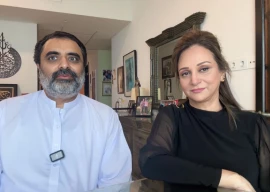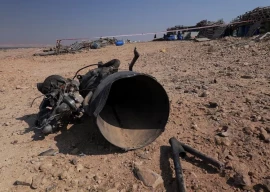KARACHI: Pakistan is living from tanker to tanker. Every month, something like six to nine cargoes of furnace oil dock at the Keamari oil terminals in Karachi and their cargo is ferried to power plants upcountry almost immediately.
Each tankers cargo is consumed within days by the hungry power plants that have sprung up across Punjab as power sector reforms stalled in the late 1990s. Every day, these power plants consume more than one billion rupees worth of furnace oil.
If this precarious supply line breaks, the power plants shut down within days since none of the players in this game can afford to maintain stocks, and the country’s power generation falls steeply.
The riots engulfing cities across Punjab are a sly reminder that countries living from tanker to tanker might want to refrain from threats to cut off other people’s supply lines, because Pakistan’s energy supply line is now operating in the danger zone and even the slightest disruption can send shockwaves through our society.
The silver lining is this: the crisis has spurred a hectic round of activity in Islamabad. Everybody, it seems, has woken up to the power sector’s woes. From the President and Prime Minister, to senior
private sector players, Islamabad has been abuzz with meetings and proposals for radical restructuring.
The results need to show within days. As of this month, Pakistan State Oil (PSO) has defaulted on its payments to refineries, and has letter of credit (LC) payments in excess of Rs80 billion to pay. HUBCO is comprehensively shut, weighed down under a fuel bill of over Rs65 billion, and KAPCO’s output is slowed to a trickle of less than 150 MW. Between them, these plants contribute up to 2,600 MW to the national grid.
A total of 3,500 MW of generating capacity has been shut down due to inability to pay their fuel bills. A ‘normal’ shortfall of 3,500 MW for this time of year has therefore ballooned to 7,000 MW, the largest it has ever been.
The crisis has been sparked by the refusal of Pakistan’s creditors to continue financing power sector losses in the absence of serious and fundamental reform decisions, and the refusal of the finance ministry to play along as well.
Firefighting will not help the situation any more. If fundamental reforms are not undertaken in earnest, and decisions taken before the weekend, the collapse can spread to the financial sector as well which is caught up in the net of the circular debt as an unwilling accomplice.
That means it doesn’t end here. Riots in the streets can be matched by default on domestic and international obligations. PSO has been avoiding default on its Letters of Credit on oil imports by getting the banks to convert these LC’s into loans.
Once the reverberations reach the financial sector, this will turn into an economic meltdown in addition to a social upheaval.
The decisions that are required are no secret. We are suffering from our growing dependence on imported furnace oil for power generation, a dependence that is boosted by our dwindling gas reserves. Additionally, our power plants are choked with inefficiencies, our distribution system plagued by leakages and losses and recovery issues.
Last night PSO received 10 billion rupees payment from HUBCO, KAPCO and WAPDA, barely enough to pay for 10 days worth of supplies. On Monday night the Petroleum Minister gave a ‘directive’ to PSO to continue supplying subsidised furnace oil to KESC. The directive did not say how the government intends to pay for the differential, nor did it clarify how last year’s price differential claims, that are still pending, will be cleared.
This action does not inspire confidence. What is needed is a set of fundamental and strategic decisions that hand over operative control of the power supply chain to independent bodies staffed by private sector professionals. Ad hoc decisions, constant firefighting, and government by directive is the approach that got us into this situation, and it must be abandoned immediately if this crisis is going to be contained.
Published in The Express Tribune, October 5th, 2011.
COMMENTS (17)
Comments are moderated and generally will be posted if they are on-topic and not abusive.
For more information, please see our Comments FAQ














































@Timour: "Things may be bad at our end, but atleast we don’t have 40% of our population living below the poverty line…."
Whether it is 40% or 30%, the fact is that a lot of Indians are poor and whether the rate is higher or lower for Pakistan , the fact also is that a lot of Pakistanis are poor. Apart from poverty there are major challenges related to literacy and health. What both countries need is to divert money from defense to social good and the only way that can happen is not just that there is peace between our countries for many years but also that there are no war mongering noises and of course no use of the strategic depth characters to achieve political goals.
Despite our problems, in India we have pushed our government to focus on public issues and hence key metrics such as literacy rate, % of kids out of schol, infant mortality rate, maternal mortality rate are better in our country compared to Pakistan. Once your people push your government on these isues,(just like you are doing with electricity woes), things will get better for you as well.
The other area is pushing for transparency in government. With anna Hazare's movement and earlier activism around Right to information, we have started the process but we have some distance to go. I would urge my Pakistani brethren to also ACTIVELY push government on this issue. Institutional solutions are needed not individual ones. For example Imran Khan says that if he was in power, he will be able to eliminate corruption because he himself is honest (which he truly is). But in India we have seen horrendous corruption under the watch of ManmohanSingh - who everyone acknowledges is personally totally honest.
Good luck friends.
Turning over control to the private sector may help --- but regardless of who manages the operation they are going to need to pay for the fuel - that means the people of Pakistan should expect significant increases in the price of energy. The days of subsidies are coming to an end - a near bankrupt Pakistan can no longer afford to shelter it's people from the real market driven prices of fuel - welcome to the real world.
PPP Govt created these thermal units in their earlier term to get double commission, from IPPs and from oil companies, now the both are pulling the country into a black hole of no return with no short term solution and Govt is not willing to do any long term solution, just passing time to complete the term and say bye bye to the people of Pakistan.
Rioters please make your way to nearest army cantt. area or DHA colonies for non-stop electricity provided in the name of defence.
@Timor: dont u know official figure below poverty line is 48% in Pakistan. Unofficially it maybe 70%. Combine that with intellectual bankruptcy, terrorism and u r the winner.
What will be the impact of eliminating the subsidy on the furnace oil. As I understand it, the subsidy is a major factor contributing to the circular debt.
Anyone care to elaborate?
@Timour - I disagree - What good is that magical 40% benchmark, if our population (majority of whom live above the poverty line) are plagued with the woes of the mismanagement, corruption and repeated abuses to the running of the power system in Pakistan. When the factories shut down, the financial sector starts to melt down, the country defaults etc.etc. will you really care if you are living below OR above the poverty line? While not all is great across the border - one thing that I see quite vividly - THEY HAVE TRIED TO STAND ON THEIR OWN 2 FEET and if that means the poverty line will hover around 40% a little longer - so be it! At least they are doing something for their nation - SADLY WE ARE NOT! PS. Before you query this - I am a true Pakistani and am proud of it!!
Riots over power cuts are the best thing happening in Pakistan. This way public will force the government to divert resources for public good. Things change when public gets active. Money supply is drying up world over and Pakistan will have to learn to live within her means. There is no way Saudis and Chinese will come to rescue.
When a few want million dollar appartments in London, millions in assets in banks abroad, they really do not care if the nation sits in darkness or even sinks.
We will have to consider short and long term options to overcome this power crisis. I am sure that the President, Prime Minister, Power/Petroleum/Finance Ministers, MDs of SNGPL/KESC/SSGC etc. with a team of other government bureaucrats are working hard to find short cuts. We need permanent solutions! This circular debt pill has to be swallowed with certain side effects. Thar Coal and large dams required in the long run. We should request the US Geological Survey or engage some commercial company to conduct gravity survey of at least Thar area if not the whole of Pakistan to find sweet spots for oil/gas/minerals. Thar Coal has water, methane and of course coal -- lets use all the resources and go for at least 10,000 MW power generation projects. A HUGE COAL MINE that can produce 80,000 to 90,000 million tons of coal a year will be required to run these power projects. Lets focus on our own resources and avoid looking around to Iran, China etc.
@Pundit....Things may be bad at our end, but atleast we don't have 40% of our population living below the poverty line....
@Pundit: right!!! DOES your power outage exceeds even 16-20 hrs a day limit? If not, good news is ourz does... & it's getting pretty habitual with it too.
lol! Cant stop laughing. Amazing headline.
We have power shortage in India but we do not make noise like Pakistanis.
Such Ugly mnemonics: IMF,WB, ADB.......
Where is China? Lets rush to china...at least Beijing has a reliable power supply!
But Darkness and perspiration are a small price to pay against strategic depth!